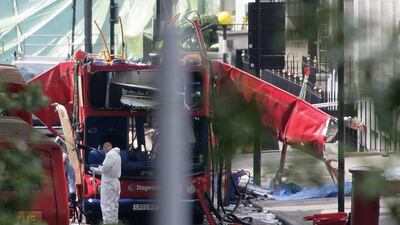Ten years ago today, four British men walked into central London and blew themselves up, taking with them the lives and futures of 52 others.
In the decade since the worst terror attack on UK soil, the way extremism is discussed in Britain – and more broadly in the West – has barely changed. But the battlefield has expanded, because jihad itself has evolved. Ten years on, the threat of extremist violence has morphed into something very different. But the conversation about that threat has barely changed.
______________________________________________________________
Read more about how extremism has changed:
■ Why is Europe exporting jihadis to the Middle East?
■ Watch: The war of ideas within global jihad
______________________________________________________________
Recall what Mohammad Sidique Khan, one of the four bombers, said in his “martyrdom” video and it is clear how different his beliefs were from those that motivate jihadis today: “Your governments continuously perpetuate atrocities against my people all over the world. Until we feel security, you will be our targets. And until you stop the bombing, gassing, imprisonment and torture of my people we will not stop this fight.”
The 7/7 bombers explicitly linked their actions to particular foreign policies. They believed they were fighting against a western invasion of the Muslim world.
Today, however, the battlefield is wider, because the interpretation of jihad has changed. Ten years of warfare in Iraq, Afghanistan and Syria have not only mutated the way jihad is fought. It has mutated why it is fought.
The jihadis of Al Qaeda, the men who motivated those bombers, are yesterday’s men. They are yesterday’s men both in terms of their military influence, their ability to wage terror attacks around the world, but also, perhaps more crucially, in terms of their intellectual influence.
Al Qaeda still exists and remains a threat. Ayman Al Zawahiri, now Al Qaeda’s leader, is still free, still organising.
But their ideas have faded. Recruits no longer flock to Al Qaeda. They have been superseded by the even more extreme ideology of ISIL.
Modern jihadis no longer fight against the foreign policies of the West. Their battle is borderless, which is why it has reached Tunisia, Libya, France, Yemen and Kuwait. ISIL no longer wish to “punish” the West. Instead, they wish to burn a fallen world and start again.
That is one reason why the battle has shifted from countries to communities. Instead of fighting what Al Qaeda used to call “the head of the snake” (the US), ISIL now go after communities: westerners in Tunisia, Christians in Libya or Shia Muslims in Kuwait.
And yet at the same time as the battle has expanded, western political elites are still repeating the same words and fighting the old political battles.
It is noticeable that in the years since 7/7, a gap has grown up between the understanding that politicians have of why the attacks took place, and the understanding the public has. Whenever terrorism or extremism is discussed in a public forum, the question of foreign policy inevitably arises. There is, in the minds of the public, an explicit link between British foreign policy before 7/7 and the attacks themselves.
Yet for politicians, this is the link that dare not speak its name.
Today, a decade after the attacks, politicians still cannot bring themselves to accept that foreign policy played any part – no matter how small – in motivating the 7/7 bombers. The idea that joining America’s invasion of Iraq in 2003 might have provided some motivation for the four men to walk onto public transport with bombs two years later is politically unpalatable. No politician could expect to say it and survive.
This is not the space to discuss what effect the Iraq war had on the safety of British civilians. But it is worth noting how limited the discussion is around terrorism and its root causes.
In the last decade, the amount of time, effort and political capital spent on policing the limits of discussion and searching for signs of “radicalism” vastly outweighs the effort spent seeking to understand the root causes of jihad, combating the ideology and constructing a serious, coherent strategy.
All the while, the threat of extremism hasn’t receded. Young men were radicalised in the past, as they are radicalised today – young women, too, as we see from the phenomenon of “jihadi brides”, European women joining ISIL to marry fighters. The threat is as potent as ever – perhaps more potent because it is underground – and it has morphed.
Europe’s sons and daughters are still deeply involved in the jihad. European fighters continue to join ISIL and Europeans continue to support ISIL’s ideology online.
And yet European governments cling to outdated ideas of why they do so. Politicians still act as if the jihadi threat is alien, foreign, something that happens beyond Britain and Europe’s borders. But the European jihadis fighting on Middle Eastern soil tell a different story.
Ten years ago, four British men murdered their fellow citizens. Nothing will bring back those men and women. But clinging to outdated ideas of the jihadi threat does nothing to solve the current problem. Indeed, it is an abdication of responsibility. And it is a profound disservice to the memory of those who died and to those who mourn them still.
falyafai@thenational.ae
On Twitter: @FaisalAlYafai


